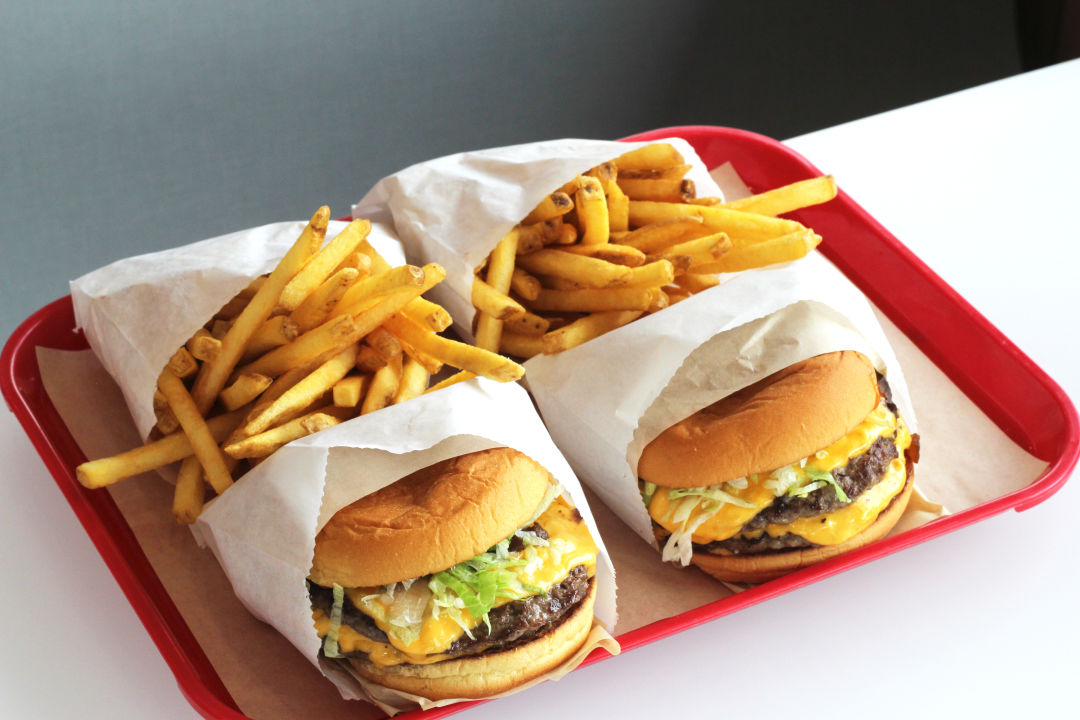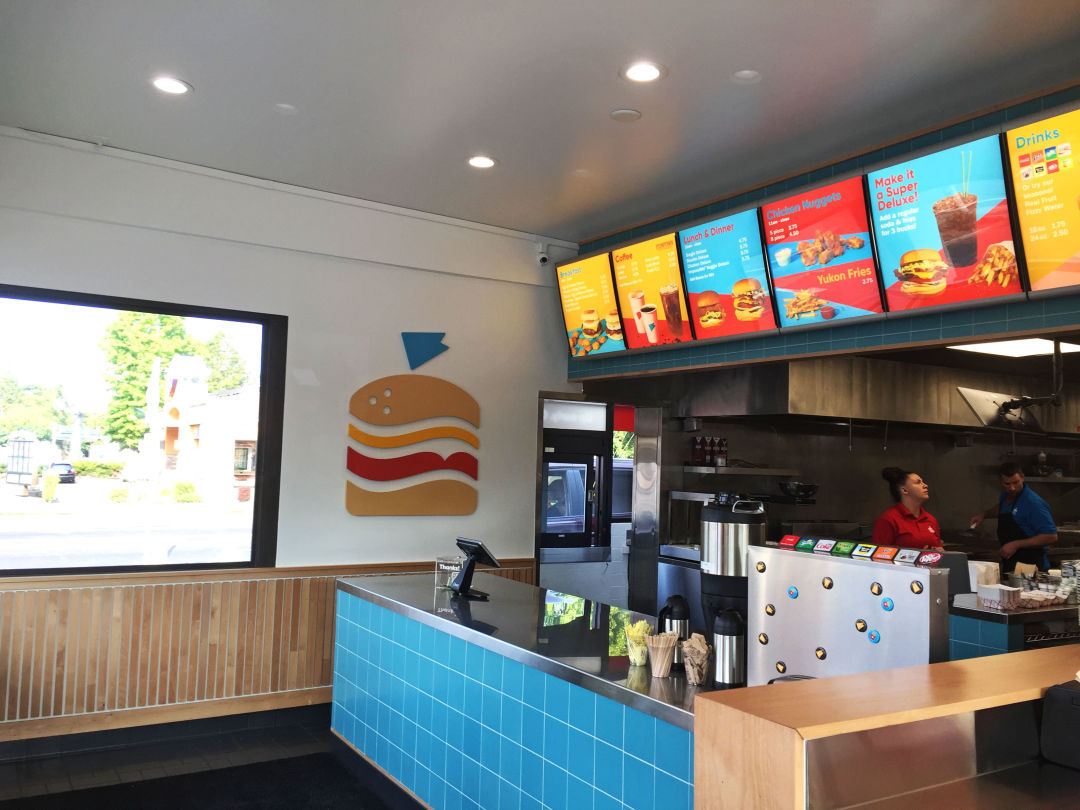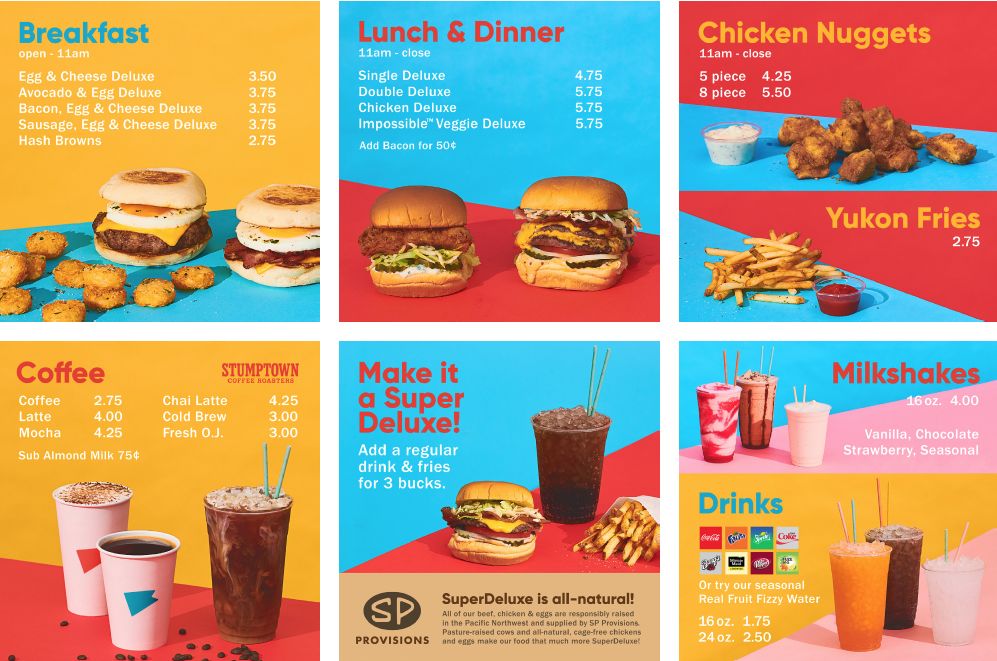Why Is Super Deluxe Rocking Portland’s Fast-Food World?

Two Super Deluxe "Double Deluxes" with fries
Image: Benjamin Tepler
If you’ve driven down Southeast Powell Boulevard recently, there’s a good chance you’ve noticed the line of cars creeping around Super Deluxe, the one-month-old In-N-Out/Shake Shack lookalike making ripples not only in Portland’s food world, but also in the fast food-heavy Foster-Powell neighborhood it straddles.
Super Deluxe, at 5009 SE Powell Blvd, is the brainchild of Micah Camden, the controversial figure who brought us Little Big Burger (and then sold it for $6 million), Blue Star Donuts, and Boxer Ramen. He’s a careful student of fashionable food trends, big-picture industry growth and decline, and the basic, hedonistic human impulse towards comfort food. With his latest venture, a straight-up drive-through burger joint, he’s struck fast food gold. There are still major kinks to be worked out, but here’s a bullish but educated guess: in four years, there will be more Super Deluxes than Burgervilles in the state of Oregon. Knowing Camden’s voracious appetite, you can hold me to that.
We caught up with the micro-chain tycoon for a little insight into his first, freakishly successful month.
At a time when fast food is in rapid decline, why open a drive-through burger place?
From a nationwide brushstroke, you’ve got Taco Times and Subways closing rapidly, KFC dropping like 10 a month. But these businesses with drive-throughs signed 20- or 30-year leases, so they've got these little carved-out spaces at prime locations throughout the city; everything has developed around them, but these long leases kept them in a sort of preserved state. And in Multnomah County, you can't build drive-throughs anymore. The only company that’s been capitalizing on this is Starbucks. They’ve seen massive growth, because every time a Wendy’s drive-through closes, they go in, paint it black, absorb all that infrastructure, and open a latte take-out window. Starbucks hasn’t seen this level of growth since the beginning. So in my mind, I’m thinking, "Great, I’ll follow in the footsteps of giants"—kind of what I’ve done all over the board—and I’m like, "Do you prefer Stumptown or do you prefer Starbucks?”
When I took over the existing Taco Time, they were averaging $500 a day in sales. That’s categorically the norm for Taco Time. It’s a dying brand, they’ve got 140, 150 locations. I’ve been open a month, and our slowest day was $12,000. The Burger King across the street … that place is done. The manager from Taco Bell across the street came over, because they’ve taken a visible hit as well. It is what it is. Any neighborhood I’ve ever gone into, I didn’t go to play nice.
This style of burger— the classic In-N-Out style—didn’t exist in Oregon, on an accessibility level, before us. Little Big Burger was kind of like a mini fast-casual bistro burger. You have other burgers, but they weren’t like the classic experience in your mouth, with the ratio of lettuce, onions, pickles, tomatoes. I had fun with LBB, and fast-casual sort of came to critical mass. Every top 10 market has the new chicken, the new burger, the new this, but then you’ve got this drive-through wasteland, with all of this infrastructure coming onto the market.
What does the “classic In-N-Out style” mean to you?
It starts from the top down and the bottom up: literally your teeth go into the bun first. So you’ll instantly taste if it’s a fresh bun, a sweet bun, or a potato bun. Shake Shack and In-N-Out’s bun is a Martin’s Bun, and there’s a reason why on any little nerd food blog you go on to, the definitive bun for a burger experience, hands down, has always been Martin's. At LBB, we never embraced the lettuce, onion, and pickle experience. And tomatoes, because the chef-snob in me says, ‘Oh, they’re not seasonal." But a vine-ripened tomato is still a tomato—it has a certain amount of acid and it’s not coated in sugar from the ketchup. There’s an interplay with the classic hamburger experience that you’re picking up on, making you happy subconsciously, like this little symphony of accessibility in your mouth. And I’m proud of my burger. I love my burger. If you go to In-N-Out, everybody wants it “Animal Style.” The reason I call it Super Deluxe is because every burger is deluxe. You don’t have ask for all of the stuff—the burger sauce has the Grey Poupon in it, and the caramelized onions are fresh every day.
But this is a step up from McDonald's, right? We’re not eating bleached, factory-raised meat?
I did the math. I was like, ‘What’s the best meat I can offer, and how can I make this fit within the mold of a successful thing?" (Editor's note: A Double Deluxe is $5.75.) Because there is a demand for a better fast food that’s not a Chick-fil-A, and not an In-N-Out, and both are those are just better by virtue of cult status, not actual offerings. We use SP Provisions, and it’s always Oregon or Northwest-raised on every level. Same with the bacon, same with the sausage. It’s the same place I’m buying my fruits and vegetables for Blue Star—and I’m charging $4 for a doughnut! I draw the line at Heinz, because when I opened up Little Big Burger, I made my own ketchup, and that came at a massive cost. And honestly, the thing that makes it all possible is … and it’s a double-edged sword … soda. People who want a burger are going to want a soda to drink with it, and that’s what enables me and every other fast food place out there to offer cheaper food. And that’s why I kept bangin’ my head against the wall at Burgerville, being like, "Why do you charge as much as you do?"

Inside Super Deluxe
Image: Benjamin Tepler
You’ve got Burgerville beef?
I look at Burgerville, and how expensive it is, and I know where they get their meat, and I know where they get their buns—I know everything about it. And I’m like, “Oh my god, you are completely taking advantage of the fact that you’re the local fast food, but you’re not actually passing on that value to customers.” They’re not paying their employees. They’re trying to fight people from unionizing. [They're not] offering $14–15 per-hour wages. $9 for a fast food burger? That’s insane! (For the record, a half-pound double Tillamook cheeseburger at Burgerville is around $6.39.)
Speaking of wages, are you hiring chefs or high school students to flip burgers?
Because not everyone was running out to work at the new fast food place, or maybe by sheer virtue of lowest common denominator, we ended up with a bunch of ex-convicts and ex-felons that were on programs, or fresh out of jail. It was this weird mix. I was hiring 16-year-old, fresh, smiley-faced people for the register, and hardened criminals to work the griddles. And I’ve been parenting since I’ve opened up. I’m like, “Hey, watch your language—there’s a 16-year old next to you,” or, “There’s a girl next to you—this isn’t the prison yard.”
But to be honest with you, when we got hit as hard as we did, those “second chance” guys came through with other guys in their program—I mean, hell, I’m an ex-felon! We got to the point where we weren’t even interviewing, we were throwing shirts and aprons at people when they walked in for an interview and said, “Get on the line, and if you can make it through the end of the day, you’ve got a job.” These people are great fucking workers, like amazingly great workers. You gotta realize, I have other types of restaurants that don’t hire these people, and I’ve got a lot of employees who suffer from “affluenza”—they just bitch about their 1 percent problems, and I’ve got these other guys that are just grateful to be working. People who set out to do that bleeding-heart mission stuff, they do it with intent. My intent was to make a good, accessible burger. Next thing you know, you have the prison yard in your kitchen.
I had nine older sisters, but only one brother, and he helped me open Yakuza, Beast, and DOC, and then he died of a drug overdose when he was 26. I didn’t do things in a way that enabled or helped him in his everyday struggle. We closed really late last night and the busses stopped running, and I gave some employees a ride home in my Range Rover. The last guy I drop off, this gentle giant who just got out of jail, is my dishwasher, and I dropped him off at a shelter downtown. I was like, dude … this is a guy who stayed and scrubbed the grease off all of the walls until 2 a.m. And that broke my fuckin’ heart. So I was like, let’s just make our starting wage $14 an hour. After training, $15. They’re doing great for us, let’s do great for them.
Are you getting West Hills matrons or fast food regulars?
It’s fifty-fifty. I have never seen such a wide swath of people coming out. That intersection is so diverse in terms of people who live out there. You have the well-heeled down to, honestly, the crackheads. They’re all there. I actually like that. That’s big-city living to me. That’s not one area just catering to one clientele. Everyone loves a good fast food burger.

Super Deluxe's menu
Image: Courtesy Micah Camden
Things were pretty rough for the first few weeks. Any takeaways?
LBB’s thing was that we cooked everything to medium-rare, and it was a thicker burger. That was a 10- to 12-minute time for fast-casual. But for fast food, you know you’re doing it well when you can get to that 6-minute mark. Our first couple of days, we were hitting 30 minutes, and I was like, "Oh my god, I’m not going to be able to fix this thing.” Originally, I put five to six guys in the kitchen. I now know why at In-N-Out there’s 50 employees—because they have an employee whose job it is to put a pickle on the bread. Now we’ve gone from 40 minutes, to 30 minutes, to 20, to 10. In a few weeks it should be moving at the appropriate speed.
Portland’s got a bit of a snobbery problem with its service industry. Like, “We are the rock stars of the service industry!” So we get to be bitchy if we want to. The reason why Chick-fil-A is Chick-fil-A is 100 percent their customer interaction. They are so nice to the people, and they treat everybody the same. At first we hired the typical vein of hipster that works the front. And sometimes they smile, and sometimes they don’t. If we’re already making people wait longer then they should, you better be kissin’ ass. Nope! We’re no longer hiring pissy, indifferent hipsters, we’re gonna hire people that are going to treat customers kind.
I put milkshakes on the menu day one, and that was a fuckin’ mistake. I was like, oh, “I’ll do hand-stirred milkshakes without a machine.” That was what was causing a 40-minute line. It was 100 degrees the day I opened, and everyone wanted a milkshake, and I don’t think I had ever made a milkshake before that. The funniest thing was, my longtime meat purveyor showed up with more meat, and he saw us freaking out with the milkshakes, and I had him make milkshakes for five hours. My meat man was making milkshakes on opening day for my restaurant for five hours! (Milkshakes will return to the menu by August 21.)
And then there was the parking. I put in a patio as a glorified way to kill those parking stalls, because no one could back out of them for the entire day—the drive-through line was blocking the spots.
This is an obvious question, but I must ask: do you have expansion plans?
Of course. Everyone knows my record. I’m already looking at other spots. I was going to meet my accountant, and I’m on Broadway on 36th, and there’s a Burger King closing. It’s just sitting empty with no plans. So … yeah.




